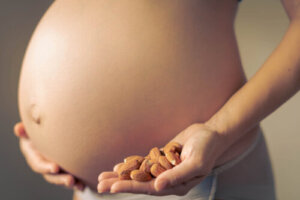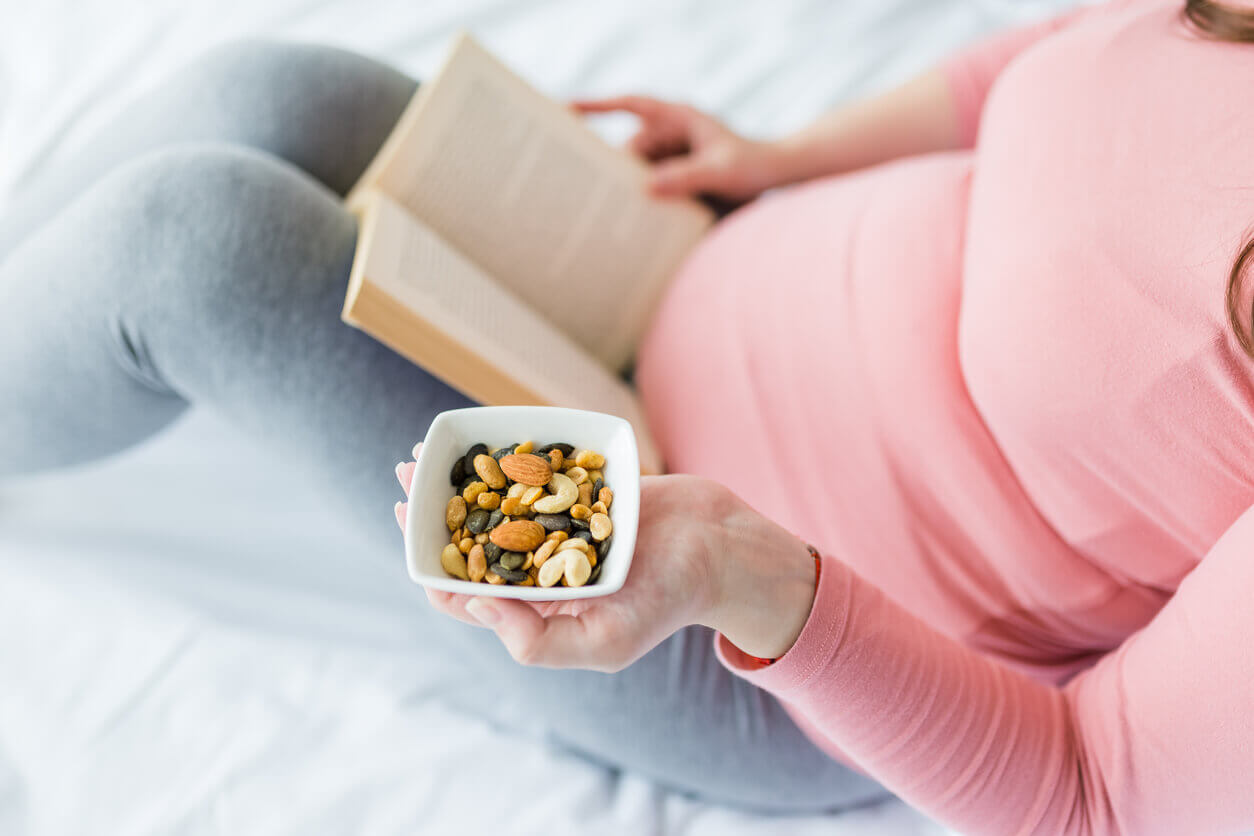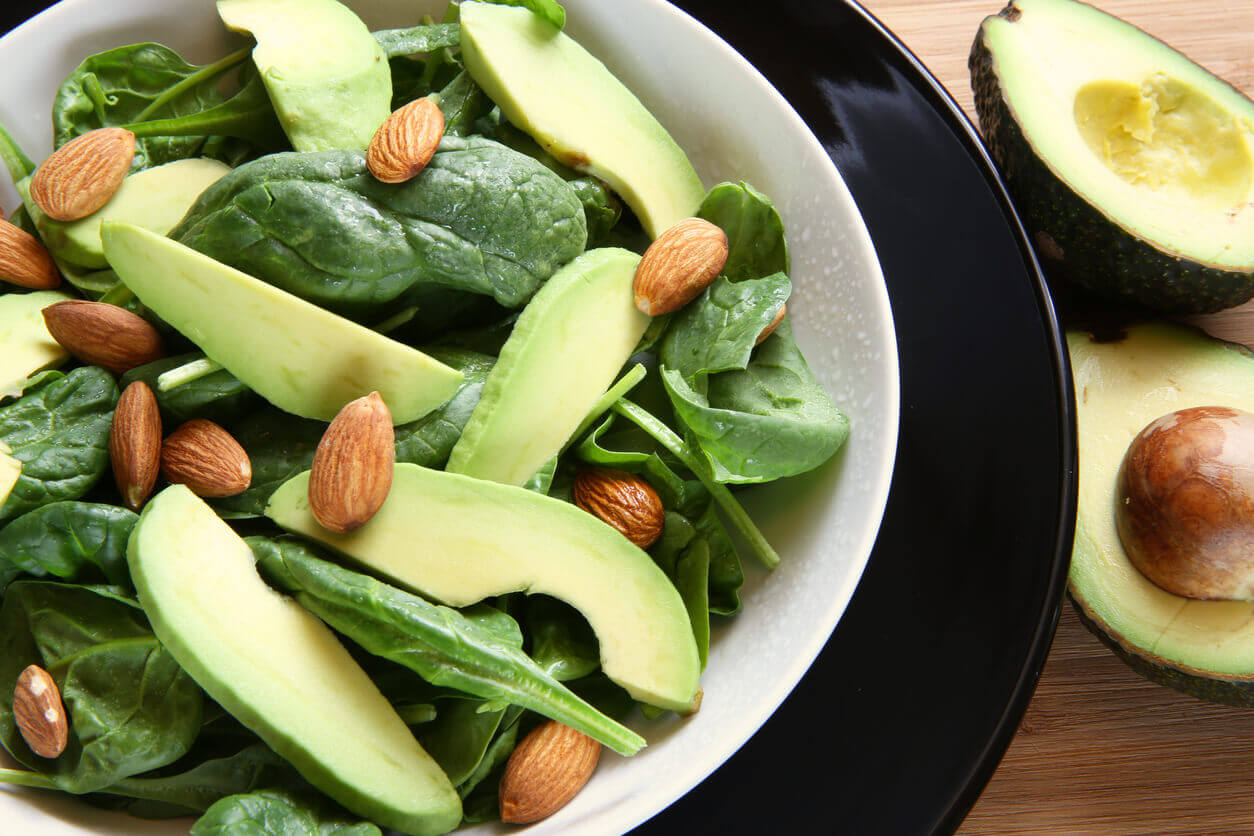Is It Safe to Eat Nuts During Pregnancy?


Written and verified by the nutritionist Saúl Sánchez Arias
Nuts are foods of the highest quality. They stand out mainly for their nutritional density. They contain a large amount of unsaturated lipids that have benefits for human health. However, there are people who wonder if they can eat nuts during pregnancy or if it’s better to restrict them to avoid problems. We’re going to tell you everything you need to know in the following article.
In any case, before you start, you have to be clear that the principles of a healthy diet are variety and balance. During pregnancy, it’s important to avoid the consumption of certain products considered to be beneficial to avoid alterations in the correct development of the fetus. However, there are alternatives to ensure an optimal nutrient intake.
Are nuts during pregnancy dangerous?
The truth is that nuts and dried fruits can be eaten during pregnancy without any fear. However, you should only avoid these products if you’ve developed a hypersensitivite reaction to them. In this case, their ingestion could trigger an inflammatory reaction that could affect the survival of the fetus. But we’re talking about specific cases. Otherwise, it’s safe to eat nuts during pregnancy.
It should be noted that these products are characterized by providing protein and a good handful of omega-3 fatty acids. These nutrients have been shown to contribute to the development of a good state of mental health in children, thus preventing disorders such as attention deficits or autism. For this reason, it’s important to emphasize their presence in the diet during pregnancy.
Nuts also contain essential micronutrients such as vitamins and minerals. Among the latter, special mention should be made of calcium, as maintaining adequate levels of calcium in the body reduces the incidence of diseases such as osteoporosis. This is evidenced by a study published in Maturitas.

How many nuts can be eaten during pregnancy?
As you’ve seen, nuts are considered beneficial during pregnancy, but in moderate quantities. We’re talking about a series of foods that stand out for their high energy value. Exceeding their consumption could cause an alteration in body composition from the gain of fat mass.
This scenario is unsuitable for the baby. Both excess weight and obesity during pregnancy increase the incidence of gestational diabetes, which could later have an impact on the child’s metabolic health. In this regard, a balanced diet that respects energy needs but avoids an excessive surplus should be considered. A handful of nuts a day is sufficient.
Which are the best nuts?
Variety is the spice of life, and this is true when it comes to nuts. It’s best to increase the range of products consumed to reduce the risk of deficiency. However, one consideration should be taken into account, namely that fried and salted nuts should be avoided.
It’s essential to prioritize the consumption of natural or roasted nuts and dried fruits. This avoids an increase in the calories provided by them, as well as a transformation of the fatty acids present in their interior. Otherwise, their healthiness could be conditioned.
Also bear in mind that we’re talking about very versatile foods at a culinary level. They can be consumed alone, although they can also be combined with yogurt. They’re even an excellent addition to salads.

It’s safe to eat nuts during pregnancy
As you’ve seen, it’s possible to eat nuts during pregnancy and experience a benefit from this habit. Except in the case of allergic women, there should be no problem with introducing these foods into the diet on a regular basis. However, fried and salty foods should be avoided so as not to alter homeostasis internally.
Keep in mind that, to ensure the proper development of the fetus, it’s important to combine a proper diet with other good health habits. These include regular physical exercise and a good night’s rest. Otherwise, physiological functions could be altered, thus reducing their efficiency. This could lead to chronic diseases.
Nuts are foods of the highest quality. They stand out mainly for their nutritional density. They contain a large amount of unsaturated lipids that have benefits for human health. However, there are people who wonder if they can eat nuts during pregnancy or if it’s better to restrict them to avoid problems. We’re going to tell you everything you need to know in the following article.
In any case, before you start, you have to be clear that the principles of a healthy diet are variety and balance. During pregnancy, it’s important to avoid the consumption of certain products considered to be beneficial to avoid alterations in the correct development of the fetus. However, there are alternatives to ensure an optimal nutrient intake.
Are nuts during pregnancy dangerous?
The truth is that nuts and dried fruits can be eaten during pregnancy without any fear. However, you should only avoid these products if you’ve developed a hypersensitivite reaction to them. In this case, their ingestion could trigger an inflammatory reaction that could affect the survival of the fetus. But we’re talking about specific cases. Otherwise, it’s safe to eat nuts during pregnancy.
It should be noted that these products are characterized by providing protein and a good handful of omega-3 fatty acids. These nutrients have been shown to contribute to the development of a good state of mental health in children, thus preventing disorders such as attention deficits or autism. For this reason, it’s important to emphasize their presence in the diet during pregnancy.
Nuts also contain essential micronutrients such as vitamins and minerals. Among the latter, special mention should be made of calcium, as maintaining adequate levels of calcium in the body reduces the incidence of diseases such as osteoporosis. This is evidenced by a study published in Maturitas.

How many nuts can be eaten during pregnancy?
As you’ve seen, nuts are considered beneficial during pregnancy, but in moderate quantities. We’re talking about a series of foods that stand out for their high energy value. Exceeding their consumption could cause an alteration in body composition from the gain of fat mass.
This scenario is unsuitable for the baby. Both excess weight and obesity during pregnancy increase the incidence of gestational diabetes, which could later have an impact on the child’s metabolic health. In this regard, a balanced diet that respects energy needs but avoids an excessive surplus should be considered. A handful of nuts a day is sufficient.
Which are the best nuts?
Variety is the spice of life, and this is true when it comes to nuts. It’s best to increase the range of products consumed to reduce the risk of deficiency. However, one consideration should be taken into account, namely that fried and salted nuts should be avoided.
It’s essential to prioritize the consumption of natural or roasted nuts and dried fruits. This avoids an increase in the calories provided by them, as well as a transformation of the fatty acids present in their interior. Otherwise, their healthiness could be conditioned.
Also bear in mind that we’re talking about very versatile foods at a culinary level. They can be consumed alone, although they can also be combined with yogurt. They’re even an excellent addition to salads.

It’s safe to eat nuts during pregnancy
As you’ve seen, it’s possible to eat nuts during pregnancy and experience a benefit from this habit. Except in the case of allergic women, there should be no problem with introducing these foods into the diet on a regular basis. However, fried and salty foods should be avoided so as not to alter homeostasis internally.
Keep in mind that, to ensure the proper development of the fetus, it’s important to combine a proper diet with other good health habits. These include regular physical exercise and a good night’s rest. Otherwise, physiological functions could be altered, thus reducing their efficiency. This could lead to chronic diseases.
All cited sources were thoroughly reviewed by our team to ensure their quality, reliability, currency, and validity. The bibliography of this article was considered reliable and of academic or scientific accuracy.
- Martins, B. P., Bandarra, N. M., & Figueiredo-Braga, M. (2020). The role of marine omega-3 in human neurodevelopment, including Autism Spectrum Disorders and Attention-Deficit/Hyperactivity Disorder – a review. Critical reviews in food science and nutrition, 60(9), 1431–1446. https://doi.org/10.1080/10408398.2019.1573800
- Cano, A., Chedraui, P., Goulis, D. G., Lopes, P., Mishra, G., Mueck, A., Senturk, L. M., Simoncini, T., Stevenson, J. C., Stute, P., Tuomikoski, P., Rees, M., & Lambrinoudaki, I. (2018). Calcium in the prevention of postmenopausal osteoporosis: EMAS clinical guide. Maturitas, 107, 7–12. https://doi.org/10.1016/j.maturitas.2017.10.004
This text is provided for informational purposes only and does not replace consultation with a professional. If in doubt, consult your specialist.








